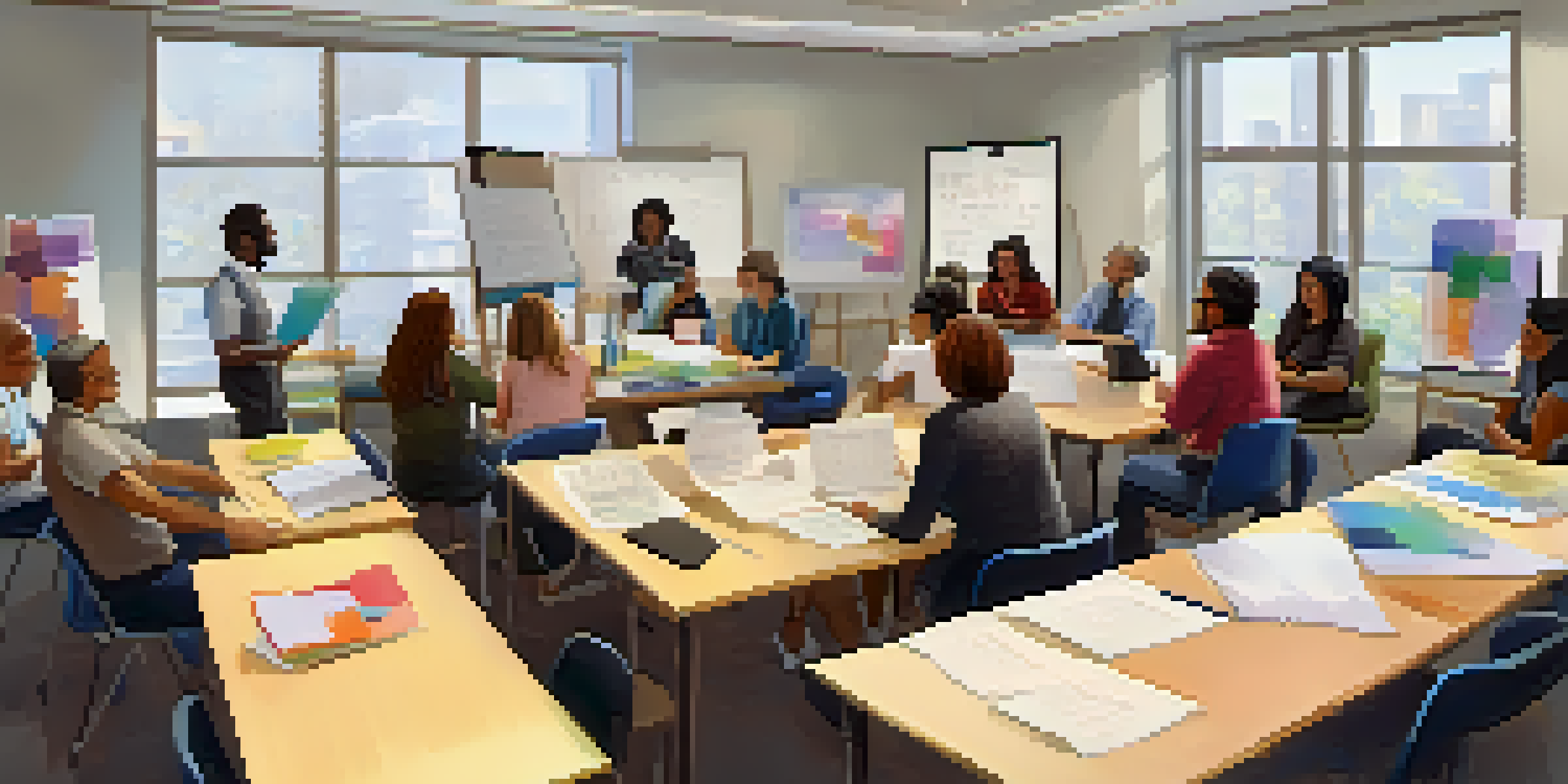Adult Learning Theories: A Comparison of Key Models

Understanding Adult Learning: An Introduction to Theories
Adult learning theories focus on how adults acquire knowledge and skills. Unlike traditional education that often caters to children, these theories consider the unique experiences and motivations of adult learners. They aim to create effective and engaging learning environments that resonate with adults' needs and preferences.
Tell me and I forget, teach me and I remember, involve me and I learn.
The foundation of adult learning lies in recognizing that adults bring a wealth of experience to the table. This means that learning is not just about absorbing new information; it’s about integrating it with existing knowledge. Understanding this integration fosters more effective learning outcomes and enhances retention.
In this article, we'll dive into several key models of adult learning, comparing their strengths and weaknesses. By exploring these theories, we can gain insights into how to create more impactful educational experiences for adults in various contexts.
Andragogy: The Art and Science of Adult Learning
Andragogy, a term popularized by Malcolm Knowles, refers specifically to the methods and principles used in adult education. Knowles proposed that adults learn differently from children, emphasizing self-direction and practical application. This model encourages instructors to facilitate rather than dictate the learning process.

One key aspect of andragogy is the importance of life experiences. Adult learners often have varied backgrounds, which can enrich discussions and collaborative learning. By incorporating learners’ experiences into the curriculum, educators can foster a more inclusive and engaging environment.
Andragogy Prioritizes Self-Direction
Andragogy emphasizes the importance of self-directed learning, encouraging adults to take charge of their education by integrating their life experiences with practical applications.
Additionally, andragogy highlights the need for adults to see immediate relevance in their learning. Adults are motivated by the practical application of knowledge. Therefore, designing courses that connect learning objectives to real-world scenarios can significantly enhance engagement and motivation.
Transformative Learning: Changing Perspectives
Transformative learning, developed by Jack Mezirow, focuses on the process by which adults change their frames of reference. This theory posits that learning occurs when individuals critically reflect on their experiences, leading to profound shifts in understanding and perspective. Such transformations often result in more autonomous and empowered learners.
Learning is not a spectator sport.
Central to transformative learning is critical reflection. This involves questioning assumptions and beliefs, which can be uncomfortable but necessary for growth. By encouraging learners to engage in this reflective practice, educators can help them uncover new insights and foster a deeper understanding of complex issues.
Transformative learning is particularly relevant in settings where social change and personal growth are prioritized. Adult education programs that emphasize discussion, collaboration, and real-world application can create opportunities for transformative experiences that resonate with learners on a personal level.
Experiential Learning: Learning Through Experience
Experiential learning, popularized by David Kolb, emphasizes the importance of experience in the learning process. According to Kolb, effective learning occurs when individuals engage in a cycle of concrete experience, reflective observation, abstract conceptualization, and active experimentation. This model highlights that learning is not a linear process but rather a dynamic, iterative cycle.
One of the key strengths of experiential learning is its focus on hands-on activities. Adults often retain information better when they can apply what they've learned in practical settings. This model encourages learners to engage actively, fostering deeper understanding and retention.
Transformative Learning Changes Perspectives
Transformative learning focuses on critical reflection, allowing adults to question their assumptions and leading to significant shifts in understanding and empowerment.
Additionally, experiential learning promotes collaboration and teamwork. Through group activities and discussions, learners can share insights and learn from one another. This social aspect of learning can enhance motivation and create a supportive learning community.
Self-Directed Learning: Taking Charge of Your Education
Self-directed learning (SDL) emphasizes the responsibility of learners to take charge of their own education. This approach encourages adults to identify their learning needs, set goals, and seek out resources independently. SDL is particularly effective for adults with busy lives, as it allows them to learn at their own pace and on their own schedule.
One of the key principles of SDL is intrinsic motivation. Adults are more likely to engage in learning when they have a personal interest or a specific goal in mind. Educators can support this by providing guidance and resources while allowing learners the freedom to explore topics that resonate with them.
Moreover, self-directed learning fosters lifelong learning habits. By instilling the skills and confidence needed to learn independently, adults are empowered to pursue knowledge beyond formal education. This creates a culture of continuous improvement and personal development.
Social Learning Theory: Learning from Others
Social learning theory, developed by Albert Bandura, posits that people learn from observing others. This model emphasizes the role of social interaction and community in the learning process. By interacting with peers and mentors, adults can gain new insights and skills through observation and imitation.
One of the core concepts of social learning is the idea of modeling. When learners see others successfully perform a task, they are more likely to attempt it themselves. This can be particularly beneficial in group learning settings, where members can share knowledge and support one another.
Experiential Learning Enhances Retention
Experiential learning highlights the value of hands-on experiences, enabling adults to engage actively and retain information more effectively through practical application.
Additionally, social learning fosters a sense of belonging and community. Adult learners often appreciate the opportunity to connect with others who share similar goals. By creating a collaborative learning environment, educators can enhance motivation and engagement among adult learners.
Conclusion: Choosing the Right Model for Adult Learning
In conclusion, understanding various adult learning theories is essential for creating effective educational experiences. Each model—whether it’s andragogy, transformative learning, experiential learning, self-directed learning, or social learning—offers unique insights into how adults learn best. Selecting the right approach depends on the context and the needs of the learners.
Educators should consider the specific goals of their programs and the backgrounds of their learners when choosing a model. For instance, workplace training may benefit from experiential and social learning, while personal development courses might lean towards transformative learning.

Ultimately, the goal is to create an inclusive and engaging learning environment that empowers adults to thrive. By integrating elements from various theories, educators can tailor their approaches to meet the diverse needs of adult learners, fostering a culture of continuous growth and development.